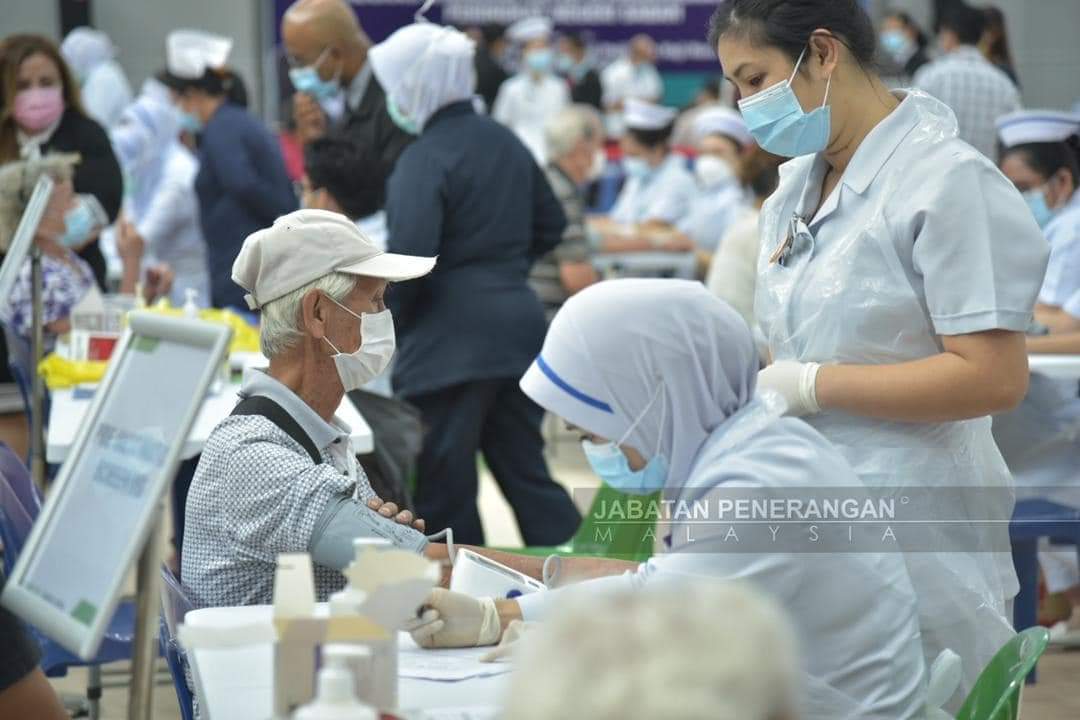The government’s decision to vaccinate working adults ahead of the elderly will likely lead to a continued high Covid-19 death toll as senior citizens – not younger adults or children – are most vulnerable to developing severe disease or dying from the virus.
The Ministry of International Trade and Industry (MITI) announced Saturday that the Public-Private Covid-19 Industrial Immunisation Programme (PIKAS) would be launched as Phase 4 of the National Covid-19 Immunisation Programme (PICK) on June 16, even though just 20 per cent of the targeted 9.4 million high-risk individuals in Malaysia have received at least one vaccine dose as of June 8.
While daily reported Covid-19 cases in Malaysia have been declining in recent days – likely due to reduced testing – fatalities continue to be reported in the dozens every day. A total of 972 Covid-19 deaths were recorded in the first 11 days of June, amounting to three to four deaths every hour.
CodeBlue’s analysis of Covid-19 deaths in Malaysia in May – when 1,290 fatalities were reported – showed that 74 per cent of victims were aged 60 years and older. About 88 per cent of coronavirus fatalities last month had underlying health conditions. While more younger adults are succumbing to Covid-19, including those without comorbidities, the elderly and those with underlying medical issues remain the primary victims dying from the disease.
The UK successfully reduced its Covid-19 death rate from a high of more than 1,000 daily fatalities last January to just 12 deaths on June 12, due to its successful vaccine rollout that opened progressively according to age group, prioritising the oldest as risk of mortality from Covid-19 increases with age. The UK’s Covid-19 vaccination programme specifically aims to prevent deaths and to maintain health and social care systems; the only “frontliners” prioritised for jabs in the UK are health and social care workers.
Malaysia’s MITI said companies from the manufacturing sector can apply for PIKAS, while agriculture, construction, plantation, and retail sectors can refer to the respective ministries to get Covid-19 jabs for workers. According to MITI, coronavirus vaccination would be prioritised for workers in the “critical” manufacturing sub-sectors of electrical and electronics, food processing, iron and steel, medical devices, personal protective equipment, oil and gas, and rubber products.
“While the vaccination for the most vulnerable groups remains a priority for the government under PICK and will not be compromised, the implementation of PIKAS is imperative to protect workers against the risk of infection,” said MITI.
If MITI represents Covid-19 Immunisation Task Force (CITF) thinking, then it is clear that CITF is choosing the economy over lives. In a situation with limited vaccine supplies and human resources to administer jabs, Malaysia’s Covid-19 vaccination programme must have priority groups. There is no such thing as claiming to prioritise everyone.
As of June 11, Malaysia has only received about 7.6 million Covid-19 doses, merely 11 per cent of the 69.6 million doses ordered from Pfizer-BioNTech, Sinovac, and AstraZeneca-Oxford (both from direct procurement and from the global COVAX Facility). As of June 12, about 4.4 million doses have been administered, which leaves some 3.2 million doses in stock.
Since PIKAS uses vaccines from the national supply, how many of the 3.2 million doses will be diverted to industries? MITI said it has received applications from about 500 companies with 106,591 workers to participate in PIKAS so far. According to the Department of Statistics, there were about 2.3 million workers in the manufacturing sector as of January 2020.
A total of 2.3 million workers would require 4.6 million doses on two-dose regimens, exceeding current vaccine supply. That’s just manufacturing; MITI has also opened up PIKAS to the agriculture, construction, plantation, and retail sectors.
MITI’s FAQ states that the charges for Covid-19 vaccination under PIKAS at common-use vaccination centres (PPVs) is RM45 per dose, comprising RM15 to ProtectHealth Corporation owned by the Ministry of Health for vaccine administration by private medical practitioners and RM30 to PIKAS PPV operators. For on-site vaccination under PIKAS, the charges are RM15 per dose to ProtectHealth plus the cost of setting up PPVs at companies’ facilities. (Estimated charges not inclusive of tax).
The government’s charges for Covid-19 vaccination – even if MITI tells employers to bear the cost for employees – contradict Vaccine Minister Khairy Jamaluddin’s previous reassurances that jabs would be free for all residents in Malaysia.
If the government – through ProtectHealth – can bear the cost of vaccination under PICK at mega PPVs and private health care facilities, why can’t it do the same for the industrial inoculation programme? Khairy said in a statement last April 27 that RM5 billion has been budgeted for PICK, comprising RM3.5 billion for vaccine procurement and RM210 million for vaccination by private medical practitioners, among other costs.
Since PIKAS uses the same vaccine supply and vaccinators as PICK, then the government should bear the cost of the entire industrial vaccination programme instead of charging Malaysians for a public health service. Otherwise, Malaysians are now essentially paying to jump the queue.
The pandemic exposed Malaysia’s lack of resiliency. One seven-week total lockdown back in March last year was enough to wipe out many small businesses and the informal employment sector. As the Malaysian epidemic continues raging, the government must figure out a way to reopen the economy safely without diverting a massive amount of vaccines to industries at the cost of the lives of elderly Malaysians.
Covid-19 infections may still occur even with vaccination; the point of inoculation is to prevent hospitalisation overcoming health care capacity and resulting mortality. Herd immunity is still an elusive concept that is being debated by international medical experts.
But if the Malaysian government believes that reopening the country is worth the sacrifice of thousands of old people, then it should come out and say so.

Boo Su-Lyn is CodeBlue editor-in-chief. She is a libertarian, or classical liberal, who believes in minimal state intervention in the economy and socio-political issues.








